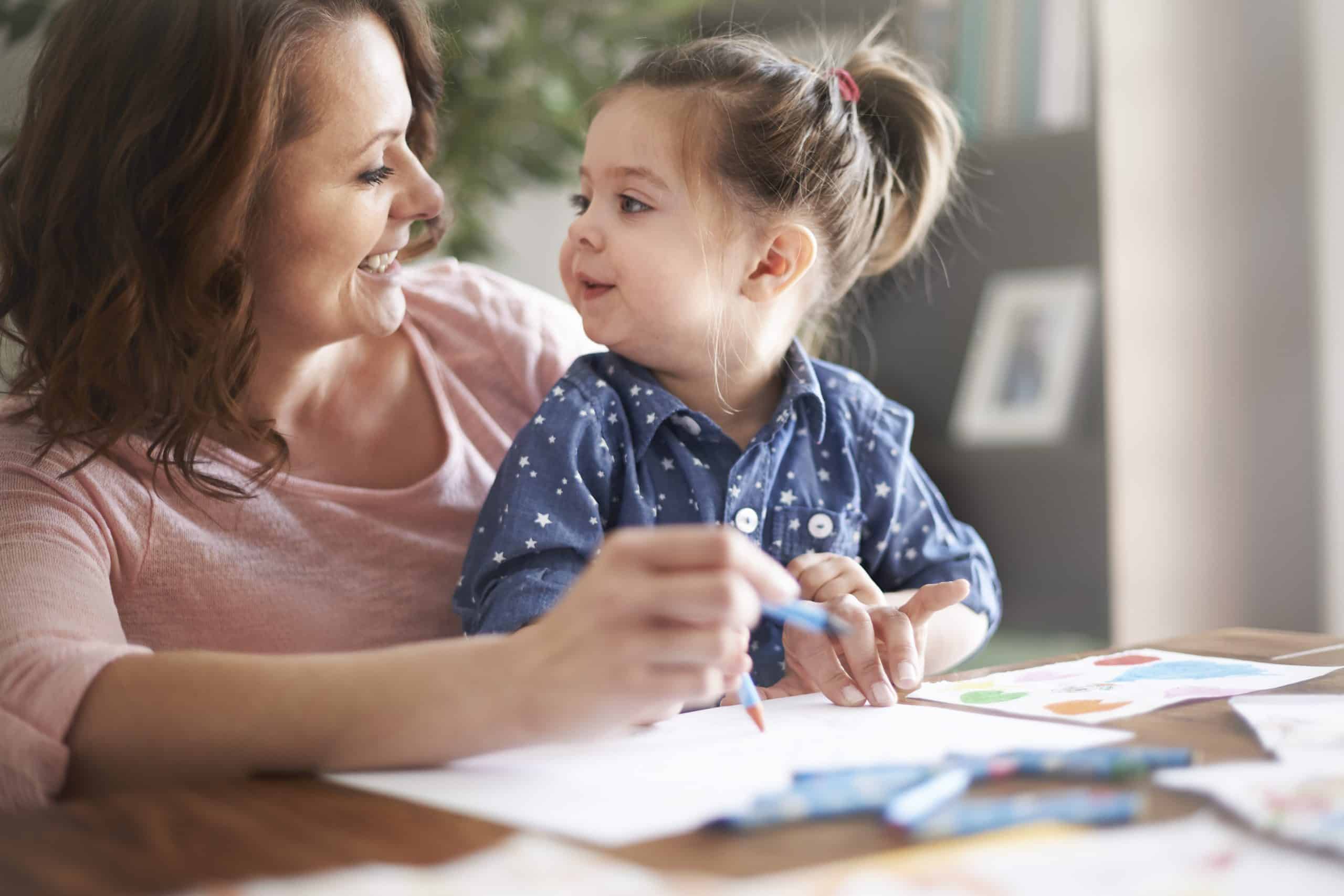Social-emotional development is vital for infants, toddlers, and preschoolers as it helps them build healthy relationships, manage emotions, and develop social skills. Early support in areas like empathy, emotional regulation, and cooperation fosters resilience, mental well-being, and future academic success, setting the stage for positive lifelong outcomes.
Young toddlers are starting to develop a sense of self-awareness—that they are separate and independent from others.
Loving relationships give young children a sense of comfort, safety, confidence, and encouragement. Nurturing connections teach toddlers how to form friendships, how to communicate emotions, and how to deal with challenges. Supportive relationships with parents, adults, and friends also help children develop trust, empathy, compassion, and a sense of right and wrong (a conscience).
Young toddlers are starting to develop a sense of self-awareness—that they are separate and independent from others. This new knowledge helps them understand that other people have thoughts and feelings that may be different from their own. Realizing this helps children begin to develop empathy—the ability to put one’s self in another person’s shoes and imagine what he is feeling. Young toddlers are also becoming more and more interested in their peers, though at this age they usually don’t play with other children, but next to or nearby. Children will begin to play more interactively with peers as they near age 3 and beyond. Here is what peer play looks like now:
Zachary, 18 months, notices an older toddler, Patrick, playing on the beach. He walks over with his shovel and carefully watches Patrick playing. Patrick’s mother asks, “Would you like to play too?” Zachary, with his mother’s prompting, starts digging a hole next to his new “friend.” He continues to watch the older child carefully and sometimes seems to imitate what he is doing. The two boys play side-by-side for a little while before the Zachary toddles away to check out the seagulls.
What You Can Do
Support young toddlers’ developing skills.
Toddlers learn best when you let them play, explore, and follow their interests. They develop new skills when you give them just enough help so that they can master a challenge without becoming overly frustrated. For example, if you see your 20-month-old trying to get the square block in the round hole of her shape- sorter, you may guide her hand over the various holes to show her how to solve the problem and let her drop it in the correct hole when she finds it.
In your work:
- Help your toddler become a confident problem-solver. Give your child some time to try to figure a problem out on his own—like how to get his rain boots on. When you see him start to get frustrated, give him the help the help he needs to master the challenge. For example, you may line up the boots with the correct feet, and then suggest the child lean on a chair while he slides a foot in.
- Praise the process, not just the result. The goal is to help children feel good about their efforts, not just the outcome. When you notice your child’s efforts ( you are working so hard on that puzzle, really thinking through where each piece fits ), it lets her know how important it is to be persistent and keep trying.
Help children learn to resolve conflict in healthy, appropriate ways.
You have probably noticed that toddlers want what they want when they want it. They have little self-control, which means they not very good at waiting and also have a hard time stopping themselves from acting on their desires. This means that, developmentally, young children struggle with following rules—especially those around sharing.
In your work:
- Provide lots of support to young toddlers playing in a group. Show them how to share. You might set a kitchen timer to give them a visual reminder of how long they have to wait for their turn. Comfort children who have trouble coping with waiting. Help them get involved in something else in the meantime.
- Play turn-taking games. Try taking turns hitting a foam ball off a tee, passing balls around a circle, or playing together in water or sand. Activities like these help children “practice” the art of sharing.
- Distract your child (Let’s look out the window at the garbage truck) or redirect their attention (I’m going to take out the play-dough now. Would anyone like to play?) to reduce or avoid conflicts. Young toddlers are not yet able to resolve conflicts through discussion.
Help your child feel safe and secure.
The world can feel scary and unpredictable to young toddlers. Now that they are walking, they can find themselves in a “strange” or unknown place (even within your house or backyard) without meaning to. They can reach things they couldn’t before (which can get them into new kinds of trouble). They might also find themselves falling more often as they master the balance and coordination needed for walking. You help your toddler feel safe when you encourage him to explore safely, and provide the support and reassurance he needs. You also help him feel secure when you have routines and transitions that take him through the day in a predictable and orderly way.
In your work:
- Be a safe “home base” for your toddler. Watch how your toddler will move away from you, look back at you as if to “check in,” and then continue on their adventure. When they feel they’ve gone too far or have encountered something “scary” (like the sound of a lawnmower next door), they toddle back to you for reassurance. When you can be a supportive partner for your curious toddler, you help her learn, grow, and develop confidence in her abilities.
- Establish routines and transitions. Knowing what to expect helps toddlers feel safe, confident, and in control of their world. Try to keep daily routines in the same order and at approximately the same time each day, and give them notice when a transition is coming. This helps your child anticipate, prepare, and cope with the many changes they have to make each day. For example, you might tell your child, After lunch, we will take sit in the rocking chair and read a story. Then I will put on the soft music and you will take a nap in your crib.
Look for ways to make your home culture part of your child’s everyday routines.
A child’s culture is an important part of who he is. The connection he has to his culture shapes his identity and self-esteem in healthy and positive ways.
In your work:
- Teach your child’s caregivers the words your family uses for important people mother, father, grandparents) and things (bottle, blanket, pacifier, etc.).
- Choose books and music that reflect your home culture. These are often available at your public library for no charge and will quickly become a beloved part of your child’s daily routines—bedtime, bath-time, or just driving in the car.
Read More



